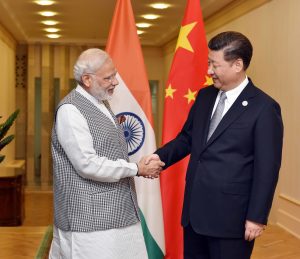By Daniel Shats
 When India revoked Jammu and Kashmir’s autonomous status in August, Pakistan was predictably outraged. But the move also provoked China, which controls the disputed Aksai Chin region in greater Kashmir. Although India insisted the India-China territorial disputes would be unaffected, China called the reorganization “unacceptable” and requested a closed UN Security Council meeting to discuss the matter on behalf of Pakistan and itself.
When India revoked Jammu and Kashmir’s autonomous status in August, Pakistan was predictably outraged. But the move also provoked China, which controls the disputed Aksai Chin region in greater Kashmir. Although India insisted the India-China territorial disputes would be unaffected, China called the reorganization “unacceptable” and requested a closed UN Security Council meeting to discuss the matter on behalf of Pakistan and itself.
Instead of exacerbating the trend of polarization, China and India should move to finally resolve their border issues. If India formally cedes Aksai Chin to China in exchange for China recognizing India’s claim to Arunachal Pradesh, the two can reduce tensions, remove a layer of complexity from the Kashmir conflict, and gain more flexibility in their international relations.
Setting aside political feasibility (for now), China and India must first recognize that there is no path short of war for either country to “regain” the regions it does not already control. To China, Aksai Chin is logistically vital to military and internal security operations, because the highway running through it is the main route connecting Xinjiang and Tibet. To New Delhi, it is a barely inhabited wasteland that has been outside India’s control for many decades. By contrast, Arunachal Pradesh is home to 1.2 million Indian citizens and is a crucial buffer against possible attack on India’s isolated northeast. China, meanwhile, willingly vacated Arunachal Pradesh after winning the 1962 Sino-Indian War, finding it too hard to defend from across the Himalayas.
This “land swap” was first proposed by Chinese premier Zhou Enlai in 1959, and China has raised it multiple times since. It would legitimize the Line of Actual Control, allowing both countries to keep the valuable regions they already administer without tangibly harming their security or strategic capabilities.
But if this is already the status quo, why change anything?
First, the border dispute is a persistent irritant in Sino-Indian relations, and formally resolving it would improve bilateral relations at a tense time. China’s alliance with Pakistan need not preclude a warmer India-China relationship; India’s ties with Iran and the United States prove it does not automatically see Pakistan’s friends and partners as its enemies. Given India’s worries about over-dependence on the U.S., once China no longer threatens Indian territory directly, India might appreciate the opportunity to shift back toward its historic nonaligned posture of “doing business with everybody,” playing Beijing and Washington against each other. Beijing, too, would surely prefer this to a more U..S-aligned India.
Second, resolving the border dispute will improve both countries’ flexibility in handling Kashmir. China’s vested interest in Kashmir has repeatedly forced it into uncomfortable positions. Its advocacy on Pakistan’s behalf seems awkward for a country that routinely objects to international meddling in its own “internal affairs.” Given China’s Xinjiang policies, its criticism of India for oppressing Kashmiri Muslims and its defense of terrorist Masood Azhar look even more hypocritical. With no more direct stake in resisting India’s territorial claims, China may decide that interfering in Kashmir is not worth losing face or risking costly entanglement. This is not to say it will stop supporting its ally Pakistan, but it will have more freedom to pick its battles with India without feeling compelled by its internal and strategic security interests.
For India, resolving the China dimension of the Kashmir conflict will reduce what India sees as third-party meddling in a bilateral dispute. This comports with the spirit of the 1972 Simla Agreement, which stipulated that India and Pakistan “must settle their differences by peaceful means through bilateral negotiations” – a point India often emphasizes. It may also somewhat weaken the China-Pakistan united front against India by eliminating a key area where Beijing and Islamabad have complementary interests.
One could argue this rosy vision ignores strong nationalist opposition on both sides to territorial concessions. But China’s past willingness to swap territory with India, Pakistan, and Russia shows it is confident in its ability to handle domestic backlash. Arunachal Pradesh carries much less nationalist significance in China than some other territorial issues, and Beijing’s censorship and propaganda regimes are robust enough to obscure the issue from public attention. On the Indian side, despite the Hindu nationalism of Narendra Modi’s BJP administration, there is no sign that Modi cares to press India’s claim to Aksai Chin; his Ministry of External Affairs has never publicly raised the issue. The prospect of reducing Chinese meddling in the Indo-Pak disputes may be more enticing than the dubious, hypothetical value of Aksai Chin, and Modi’s nationalist credentials and political dominance in India give him considerable political capital to weather any criticism over the “concession.”
At the next round of border negotiations, the two sides should seriously consider this proposal. Such a momentous deal may be just what both countries need to improve their security environment and mitigate the growing polarization.
Daniel Shats is a research intern with the Party Watch Initiative of the Center for Advanced China Research, where he contributes to the Center’s Chinese language research on PRC politics and foreign affairs. He is also a graduate student at Johns Hopkins-SAIS.
No comments:
Post a Comment